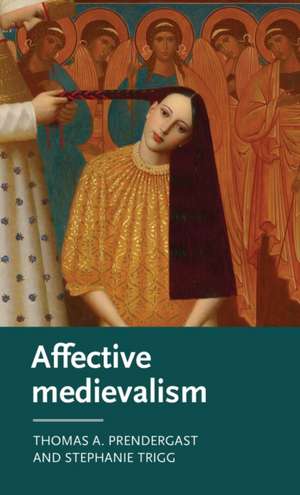Affective Medievalism: Manchester Medieval Literature and Culture
Autor Stephanie Triggen Limba Engleză Hardback – 24 sep 2018
This book investigates the troubled relationship between medieval studies and medievalism, asking what the term 'medievalist' means in the twenty-first century.
Medievalism in its abject, atavistic and nostalgic forms is everywhere today, and there are fewer and fewer positions for the medieval scholar to take. One response is to acknowledge that the medieval and medievalism are mutually constitutive, not just in the modern era but from the Middle Ages on. Using affective strategies to read medieval and medievalist texts, this study reveals the concerns those texts share about the nature of temporality and the way we approach or 'touch' the past. More than that, it demonstrates that medieval writers can provide us with powerful models for understanding how contemporary desire determines the constitution of the past. This desire can reconnect us with the lost history of what we might call the 'medievalism of the medievals' - in other words, coming to terms with the history of the medieval is to understand that it already offers us a model of how to relate to the past.
Aimed at advanced students, post-graduates and specialist academic readers, this imaginative study will also be of interest to practitioners of medievalism, from fiction writers to filmmakers.
Din seria Manchester Medieval Literature and Culture
- 23%
 Preț: 536.76 lei
Preț: 536.76 lei -
 Preț: 246.94 lei
Preț: 246.94 lei -
 Preț: 205.92 lei
Preț: 205.92 lei - 23%
 Preț: 537.36 lei
Preț: 537.36 lei -
 Preț: 274.50 lei
Preț: 274.50 lei -
 Preț: 154.40 lei
Preț: 154.40 lei - 23%
 Preț: 537.64 lei
Preț: 537.64 lei -
 Preț: 206.89 lei
Preț: 206.89 lei -
 Preț: 207.49 lei
Preț: 207.49 lei -
 Preț: 154.01 lei
Preț: 154.01 lei - 23%
 Preț: 569.49 lei
Preț: 569.49 lei -
 Preț: 206.67 lei
Preț: 206.67 lei -
 Preț: 422.63 lei
Preț: 422.63 lei - 23%
 Preț: 722.03 lei
Preț: 722.03 lei - 23%
 Preț: 537.01 lei
Preț: 537.01 lei -
 Preț: 206.34 lei
Preț: 206.34 lei - 14%
 Preț: 521.00 lei
Preț: 521.00 lei -
 Preț: 248.54 lei
Preț: 248.54 lei -
 Preț: 205.09 lei
Preț: 205.09 lei - 23%
 Preț: 539.01 lei
Preț: 539.01 lei - 23%
 Preț: 536.60 lei
Preț: 536.60 lei -
 Preț: 209.66 lei
Preț: 209.66 lei -
 Preț: 254.71 lei
Preț: 254.71 lei - 23%
 Preț: 537.56 lei
Preț: 537.56 lei - 19%
 Preț: 370.52 lei
Preț: 370.52 lei - 23%
 Preț: 536.09 lei
Preț: 536.09 lei - 23%
 Preț: 537.60 lei
Preț: 537.60 lei - 14%
 Preț: 551.51 lei
Preț: 551.51 lei - 23%
 Preț: 568.49 lei
Preț: 568.49 lei -
 Preț: 340.42 lei
Preț: 340.42 lei -
 Preț: 347.62 lei
Preț: 347.62 lei - 23%
 Preț: 718.35 lei
Preț: 718.35 lei -
 Preț: 266.39 lei
Preț: 266.39 lei - 23%
 Preț: 745.45 lei
Preț: 745.45 lei -
 Preț: 345.64 lei
Preț: 345.64 lei - 23%
 Preț: 720.56 lei
Preț: 720.56 lei - 23%
 Preț: 718.18 lei
Preț: 718.18 lei -
 Preț: 280.67 lei
Preț: 280.67 lei - 23%
 Preț: 802.37 lei
Preț: 802.37 lei - 23%
 Preț: 722.03 lei
Preț: 722.03 lei - 23%
 Preț: 722.03 lei
Preț: 722.03 lei - 23%
 Preț: 723.50 lei
Preț: 723.50 lei - 23%
 Preț: 719.95 lei
Preț: 719.95 lei - 23%
 Preț: 718.35 lei
Preț: 718.35 lei - 23%
 Preț: 719.82 lei
Preț: 719.82 lei
Preț: 535.89 lei
Preț vechi: 695.96 lei
-23% Nou
102.54€ • 107.33$ • 85.35£
Carte disponibilă
Livrare economică 10-24 martie
Livrare express 22-28 februarie pentru 26.31 lei
Specificații
ISBN-10: 1526126869
Pagini: 176
Dimensiuni: 138 x 216 x 14 mm
Greutate: 0.36 kg
Editura: MANCHESTER UNIVERSITY PRESS
Seria Manchester Medieval Literature and Culture
